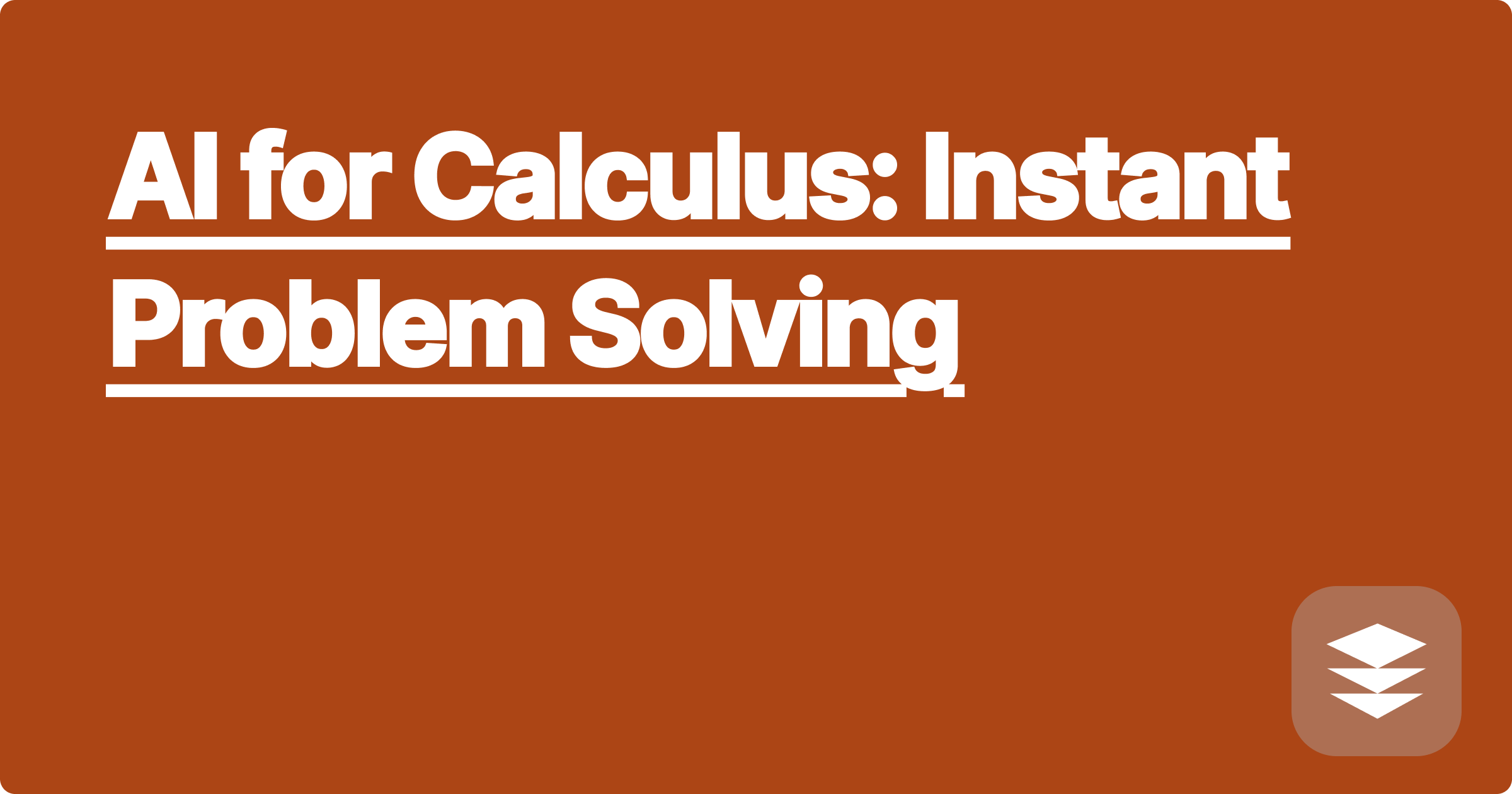
The world of STEM is exciting and challenging, a constant push and pull between complex concepts and the thrill of discovery. But let’s be honest, sometimes those complex concepts can feel overwhelming, especially when you’re juggling multiple courses, research projects, and a life outside of academia. Calculus, in particular, has been a notorious stumbling block for many STEM students. Thankfully, we live in an age where artificial intelligence is rapidly transforming how we learn and research, offering powerful tools to navigate these academic hurdles. This blog post will explore how AI can become your personal calculus tutor, helping you grasp those tricky concepts, conquer your homework, and free up valuable time for deeper learning and exploration.
Imagine having a personalized AI partner who can guide you through complex integrations, explain derivatives in simple terms, and even help you strategize your study sessions. This isn't science fiction; it's the reality of what AI can offer STEM students today. We'll delve into the world of AI-powered calculus problem-solving, exploring both well-known platforms like Wolfram Alpha and lesser-known tools specifically designed for mathematical exploration. We'll also discuss how you can integrate these tools into your workflow, not just for solving homework problems, but also for deepening your understanding of calculus and boosting your overall academic performance. And, importantly, we'll share practical tips and real-world examples to demonstrate how you can leverage AI to achieve your academic goals.
Calculus, with its intricate concepts of derivatives and integrals, can often feel abstract and challenging to apply. Many students struggle to visualize the relationship between these concepts and real-world applications. The sheer volume of practice problems required to master calculus can be time-consuming and sometimes demotivating. Traditional learning resources, like textbooks and lectures, can often lack the personalized support needed to address individual learning styles and paces. This can lead to frustration and a feeling of being lost in a sea of formulas and theorems. Furthermore, finding efficient ways to manage time and prioritize tasks is crucial for STEM students, and effectively integrating AI tools can be a game-changer in this regard.
AI provides a powerful toolkit for tackling these challenges head-on. Wolfram Alpha, for example, is an excellent computational knowledge engine that can solve complex calculus problems step-by-step, providing not just the answer but also the underlying logic. This can be incredibly helpful for understanding the "why" behind the solution, not just the "how." Beyond Wolfram Alpha, several lesser-known AI tools are emerging that offer specialized capabilities for calculus. One such tool is Symbolab, which provides detailed solutions to a wide range of calculus problems, including integrals, derivatives, limits, and series. Another valuable tool is Mathway, which offers similar functionalities but also includes a user-friendly interface for graphing and visualizing functions. These tools can be invaluable for understanding complex concepts and identifying areas where you need to focus your studies.
Integrating AI into your calculus workflow is straightforward. Let’s say you’re struggling with a tricky integration problem. First, clearly define the problem, including all given variables and constraints. Then, input the problem into your chosen AI tool, whether it’s Wolfram Alpha, Symbolab, or Mathway. The AI will process the input and generate a step-by-step solution. Carefully review each step, ensuring you understand the logic and the applied rules. If any part of the solution is unclear, use the tool's explanatory features or consult additional resources. This process not only helps you solve the immediate problem but also reinforces your understanding of the underlying concepts.
Consider the integral ∫x²e^x dx. Inputting this into Wolfram Alpha provides not only the solution (x²e^x - 2xe^x + 2e^x + C) but also a breakdown of the integration by parts method used to arrive at the answer. Similarly, Symbolab can be used to find the derivative of a complex function like f(x) = sin(x²)cos(x). The AI will provide the derivative (2xcos(x²)cos(x) - sin(x²)sin(x)) and the differentiation rules applied. These examples illustrate how AI can provide detailed solutions and explanations, promoting a deeper understanding of calculus concepts.
To maximize your learning with AI, consider these strategies. First, don't just rely on AI for answers; use it as a learning tool. Actively engage with the solutions provided, understanding the steps and the underlying concepts. Second, experiment with different AI tools to find the ones that best suit your learning style and needs. Third, integrate AI into your broader study strategy. Use it to check your work, explore alternative solution methods, and identify areas where you need more practice. Fourth, leverage AI for time management. By automating the tedious aspects of problem-solving, you can free up time for deeper learning and other important tasks. Finally, don't be afraid to seek help when needed. AI is a powerful tool, but it's not a replacement for human interaction and guidance.
Conclude by remembering that AI is a powerful ally in your STEM journey. By strategically integrating these tools into your workflow, you can overcome challenges, deepen your understanding of complex concepts, and achieve your academic goals. Embrace the power of AI, and watch your calculus skills soar.
AI in Chem Eng: Optimize Lab Processes
AI for Calculus: Instant Problem Solving
AI Biology Tutor: Ace Your Exams
AI for Robotics: Design & Simulate
AI for Stats: Analyze Data Easily
AI in Computer Science: Learn to Code
AI for Materials Science: Discover
AI for Linear Algebra: Solve Equations